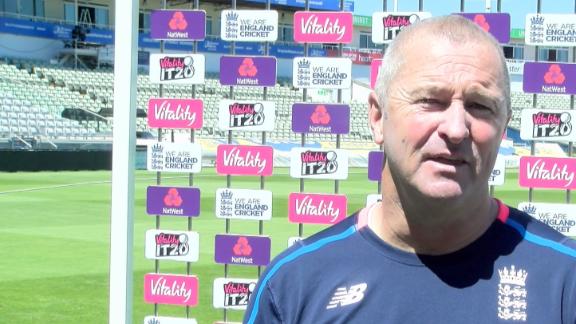England 221 for 6 (Buttler 60, Hales 49, Roy 44) beat Australia 193 (Finch 84, Rashid 3-27, Jordan 3-42)
Live scorecard and ball-by-ball details
Jos Buttler thumped the fastest half-century in his nation's T20I history to help England withstand a brilliant innings from Aaron Finch and record another resounding victory against Australia at Edgbaston.
The result, coming on the heels of England's 5-0 victory in the ODI series, means Australia have lost all six international fixtures as part of their tour to England and Wales. They depart for a tour of Zimbabwe on Thursday.
Buttler, promoted to open the innings after an excellent end to his IPL season in the same position, thrashed 50 from just 22 balls as England posted the second-highest total in their 101-match T20 history. Their highest T20I score remains the 230 made against South Africa in Mumbai in 2016, while the previous record for fastest half-century was 23 set by Ravi Bopara.
Even by the standards of these punch-drunk days, when England seem to set new batting records by the week and feats we once thought impossible have become commonplace, Buttler's batting here was remarkable. The speed of the hands, the range of strokes, the power and timing combined leave little margin for error for bowlers and make perfectly respectably-sized boundaries appear impossibly small.
As early as the fourth over here, he followed a six over long-on with a ramped four from the next delivery and then produced what was basically a cross-court winner that would have pleased Roger Federer. The over cost 23 and set the tone for an unhappy evening for the bowler, Kane Richardson.
For it was Richardson, on the long-off boundary, who spilt a simple chance offered by Jason Roy when the batsman had 27, Richardson who allowed Alex Hales a two with a misfield and Richardson who conceded 59 from his four overs; the second most expensive analysis in Australia's T20I history. Later - inevitably, really - he came to the crease in an impossible position and slogged his first ball to mid-off.
Partly due to Richardson's slip in the field, Roy - who made 44 from 26 balls - helped Buttler post 95 for the first wicket (England's sixth-highest opening stand in this form of the game) with 70 of them coming in the six-over Powerplay. With Hales following up with 49 from 24 balls - for a while it seemed he would break Buttler's new record - and Jonny Bairstow underlining the depth of England's batting by driving his first and final deliveries for six, England easily reached 200 for the first time in a home T20.
It was clear from the first ball that this was to be a trying night for the bowlers. The ease with which Roy caressed the opening delivery of the match to the midwicket boundary spoke volumes for the nature of the surface: the sort of wicket of which batsmen dream and bowlers shiver. The over cost 13 and, when Mitchell Swepson, the debutant legspinner was introduced, Buttler immediately came down the pitch and, having first smeared him through mid-wicket for a boundary, then deposited him over long-on for six.
Later Billy Stanlake missed his attempted yorker by an inch or two and Buttler, stepping back to give himself room, drove over extra cover for 6. It was a shot that would have pleased Viv Richards. Buttler's 50 contained six fours, four sixes and four singles. And not once did he play and miss.
With Australia losing five wickets in the first 10 overs of their innings, it seemed they were heading to a heavy defeat. But Finch had other ideas and, after being starved of the strike for much of the opening overs - he faced only 19 balls in the first 54 - launched an assault on Moeen Ali's offspin that threatened to turn the game.
Demonstrating awesome power, he deposited Moeen for five sixes and three fours - most of them over midwicket - as he added 86 in seven overs for the seventh-wicket with Ashton Agar.
But Adil Rashid, who bowled 11 dot balls, and took three wickets kept his head and had Finch caught on the long-on fence by Chris Jordan. And with nobody else in the top six making 20, England's total always looked just out of reach. Australia went down swinging, bowled out with two balls remaining.
It was a good night, too, for Jordan. Having produced a well-disguised slower-ball to defeat Glenn Maxwell, he showed good pace and control of his yorker to end Agar's resistance. He remains England's outstanding fielder, too.
For Australia there was some fine bowling from AJ Tye - who conceded just three from the fifth over of the innings and a respectable eight from the last - while Agar and Finch can also look back on this game with some pride. But losing all six internationals against the old enemy must rank this as one of the worst tours an Australian team has ever had to England.




